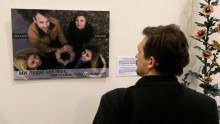The authors of the project “We Are Human. We Are Equal” have taken a number of photographs of various people – a Christian and a Muslim woman, an African emigrant and a Ukrainian, a boy and an elderly woman – who hold each other’s hands and smile. The pictures are being exhibited now at the National Taras Shevchenko Museum. The exhibit organizers are urging people to drop stereotypes and not to shut themselves off those who differ in something. The project was prepared by the non-governmental organization Crimea SOS with support from the UN Refugee Agency.
“THE PROBLEM OF INTOLERANCE ARISES IN CHILDHOOD”
“Everybody has acquaintances with disabilities or some other particularities. So it was quite easy to find project characters,” says Emine Asanova, author of the exhibit idea. “There were perhaps some problems with a couple that represented different religions – Christianity and Islam. We first wanted to show two ministers of religion, for example, a priest and an imam. But it is not so easy to make a deal with them, for there are certain rules to observe. So we photographed some followers of the two religions.”
The organizers focused on positive examples – they showed people who had avoided discrimination and achieved success in life. “I took part in this project because my disability does not pose an obstacle to working with my colleagues on an equal basis,” Uliana Pcholkina, a wheelchair-bound TV presenter, confesses. “I am not discriminated against, and I’d like all the disabled persons to be treated like this. We are equal and must choose the way of life on our own.”

Uliana’s colleague Svitlana Shevchenko, also participating in the project, adds: “Uliana herself has an impact on the life of other people. I’ve learned from her to be confident and defy the malice of people. The problem of intolerance against ethnic minorities, persons with disabilities and non-traditional sexual attitudes arises in childhood, when parents are unable to explain to their children that we are all equal and unique.”
“CONFLICTS BEGIN WHEN DIFFERENCES ARE NOT ACCEPTED”
The “adult-child” pair is also in one of the project’s works. “A child’s needs, thoughts, expectations, and worries are as important as the problems of an adult,” says psychologist Dana Nahorna, the picture’s heroine. “Adults often think that the child understands nothing and cries ‘just’ over some toy. But such small problems teach the child to overcome big difficulties. And respect for him or her as a personality guarantees that the person will then respect themselves and others.”
There are very many vulnerable people in Ukraine now due to the war, Nahorna points out. Migrants and ATO participants have emerged, and there still remain orphaned children, persons with disabilities, and pensioners. Still, the Ukrainians’ level of tolerance is gradually changing for the better. One of the signs of this is that more and more people view a visit to the psychologist as a normal practice. “Conflicts begin when differences are not accepted. When we begin to seek some unifying things, many problems are solved,” Nahorna emphasizes.
The exhibit “We Are Human. We Are Equal” will remain open at Kyiv’s National Taras Shevchenko Museum until February 28 inclusive.







